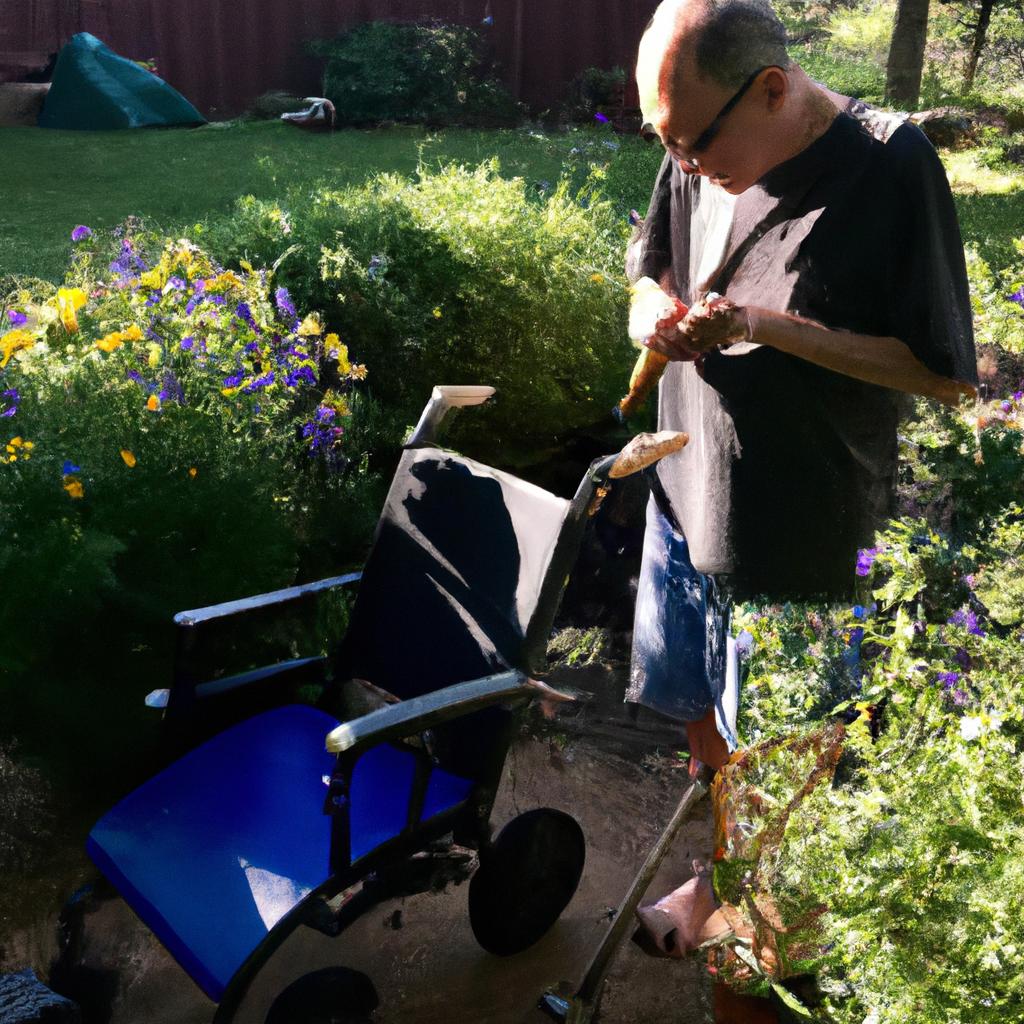Introduction
Have you ever wondered how individuals with physical limitations can continue pursuing their love for gardening? Well, the answer lies in the incredible world of handicap garden tools. These tools have revolutionized the way people with disabilities can engage in gardening, providing them with accessibility and the freedom to cultivate their own green oasis. In this article, homegardenartful.com will explore the significance of handicap garden tools and how they can empower individuals with physical limitations to enjoy the therapeutic benefits of gardening.
Gardening has always been a cherished pastime, offering solace and a sense of fulfillment. However, traditional gardening tools can pose challenges for those with physical disabilities, making it difficult to participate fully in this beloved activity. This is where handicap garden tools come to the rescue, leveling the playing field and enabling people with physical limitations to embrace their green thumbs.
Overview of how these tools can improve accessibility and independence in gardening
Handicap garden tools are specially designed to cater to the needs of individuals with physical disabilities or limitations. These tools are equipped with innovative features that enhance accessibility and ease of use, allowing individuals to garden without unnecessary strain or discomfort. From ergonomic handles that provide a comfortable grip to lightweight materials that reduce physical exertion, these tools have been thoughtfully crafted to ensure a seamless gardening experience for all.
By using handicap garden tools, individuals with physical limitations can regain their independence in gardening. They no longer have to rely on others for assistance or compromise on their gardening aspirations. With the right tools at their disposal, they can tend to their plants, sow seeds, prune, and weed with ease. These tools not only empower individuals but also promote physical and mental well-being through the therapeutic benefits of gardening.
In the next section, we will delve deeper into the different types of handicap garden tools available and the incredible benefits they offer. Join me as we explore how these tools can transform the gardening experience for individuals with physical limitations.
Understanding Handicap Garden Tools

Definition and Explanation of Handicap Garden Tools
Handicap garden tools are specifically designed gardening implements that cater to the unique needs of individuals with physical limitations. These tools are crafted with the principles of accessibility and usability in mind, ensuring that gardening activities can be enjoyed by everyone, regardless of their physical capabilities. By incorporating features such as ergonomic design, adjustability, and lightweight materials, handicap garden tools enable individuals with disabilities to engage in gardening comfortably and independently.
These tools are not just adaptations of traditional gardening equipment; they are purpose-built to address the challenges faced by individuals with physical limitations. From modified handles that provide a secure grip to tools with extended reach, handicap garden tools are tailored to accommodate a range of physical disabilities, including limited dexterity, reduced mobility, and muscle weakness. By utilizing these tools, individuals can overcome barriers and actively participate in the joys of gardening.
Different Types of Tools Available for Various Physical Limitations
Handicap garden tools encompass a wide range of implements, each designed to assist individuals with specific physical limitations. Here are some notable types of handicap garden tools:
1. Adaptive Gripping Tools
These tools feature specialized handles that improve grip and control, making it easier for individuals with limited hand strength or dexterity to hold and operate them. Adaptive gripping tools may include garden shears, trowels, and pruners with ergonomic handles or those designed to be operated with minimal pressure.
2. Long-Reach Tools
Long-reach tools are ideal for individuals who face challenges in bending or reaching due to mobility issues. These tools have extended handles, allowing individuals to tend to plants or perform tasks without straining their bodies. Examples of long-reach tools include long-handled pruners, weeders, and cultivators.
3. Raised Bed Tools
For gardeners with limited mobility or wheelchair users, raised bed tools are essential. These tools are designed specifically for gardening in raised beds or containers, ensuring that individuals can easily reach and tend to their plants without the need for excessive bending or kneeling. Raised bed tools may include long-handled trowels, cultivators, and watering wands.
4. Ergonomic Tools
Ergonomic garden tools are designed with the comfort and well-being of individuals in mind. These tools feature handles that reduce strain on the hands, wrists, and joints, promoting better posture and minimizing the risk of repetitive strain injuries. Examples of ergonomic tools include hand trowels, shovels, and rakes with cushioned grips and angled handles.
By understanding the various types of handicap garden tools available, individuals with physical limitations can select the tools that best suit their needs and enable them to fully enjoy the art of gardening. In the next section, we will explore the benefits of utilizing these tools in more detail. So, let’s dig deeper and uncover the advantages that handicap garden tools bring to the gardening experience for individuals with physical limitations.
Benefits of Handicap Garden Tools

Gardening is not just a hobby; it is a way of life for many. For individuals with physical disabilities, handicap garden tools offer a lifeline to this cherished activity. Let’s explore the remarkable benefits that these tools bring, revolutionizing the gardening experience for those with physical limitations.
Enhancing Accessibility and Ease of Use for Individuals with Disabilities
One of the primary advantages of handicap garden tools is their ability to enhance accessibility. These tools are designed with features that cater to different physical limitations, making gardening a more inclusive activity. Whether it’s a tool with extended handles for individuals with limited reach or tools with larger grips for those with dexterity issues, these adaptations ensure that everyone can comfortably and effectively work in their gardens.
By providing individuals with disabilities the means to access their gardens and tend to their plants, handicap garden tools break down barriers and promote independence. No longer limited by physical constraints, individuals can actively participate in gardening, nurturing their plants and creating beautiful landscapes with confidence.
Allowing Individuals to Continue Pursuing Their Gardening Hobbies or Activities
Gardening is not just a hobby; it is a passion that brings joy and fulfillment. Handicap garden tools enable individuals with physical limitations to continue pursuing their gardening hobbies or activities. These tools empower them to engage in a meaningful and rewarding pastime, maintaining a connection to nature and their personal green spaces.
Imagine being able to sow seeds, plant flowers, and harvest fresh produce despite physical limitations. Handicap garden tools make this a reality, allowing individuals to continue their gardening journey and explore the endless possibilities that nature offers.
Promoting Physical and Mental Well-being through Gardening
Gardening is known for its therapeutic benefits, promoting both physical and mental well-being. For individuals with disabilities, these benefits are even more profound. Handicap garden tools provide an avenue for physical activity, improving strength, coordination, and overall fitness. Engaging in gardening tasks can also help with range of motion and flexibility.
In addition to the physical benefits, gardening has a positive impact on mental well-being. The act of nurturing plants, witnessing their growth, and connecting with nature can reduce stress, anxiety, and depression. It provides a sense of purpose, accomplishment, and connection to the natural world.
In the next section, we will explore the key features to consider when selecting handicap garden tools. Join me as we uncover the elements that make these tools truly exceptional and suited for individuals with physical limitations.
Key Features to Consider in Handicap Garden Tools
When it comes to choosing the right handicap garden tools, there are several key features that you should consider. These features ensure that the tools are not only effective but also cater to the specific needs of individuals with physical limitations. Let’s explore some of the essential features that make these tools stand out in the world of gardening.
Ergonomic Design for Comfortable and Efficient Use
One of the most important aspects of handicapped garden tools is their ergonomic design. These tools are meticulously crafted to provide a comfortable and efficient grip, reducing strain and fatigue on the user’s hands and wrists. Ergonomic handles with contoured shapes and cushioned grips offer a secure grasp, allowing individuals to garden for extended periods without discomfort. By minimizing the stress on joints and muscles, these tools enable individuals to engage in gardening activities with ease and enjoyment.
Lightweight Materials to Minimize Strain on the User
Another crucial feature to consider in handicap garden tools is their lightweight construction. Traditional gardening tools are often heavy, making them difficult to maneuver for individuals with physical limitations. However, handicap garden tools are typically made from lightweight materials such as aluminum or reinforced plastic, significantly reducing the strain on the user’s body. This feature ensures that individuals can handle the tools effortlessly, minimizing the risk of fatigue or injury during gardening tasks.
Adjustable Features to Accommodate Different Physical Limitations
Individuals with physical limitations may have diverse needs and requirements when it comes to gardening tools. That’s why many handicap garden tools offer adjustable features to accommodate different physical limitations. Adjustable handles, for example, can be extended or repositioned to suit the user’s height or grip preferences. Additionally, tools with adjustable angles or lengths allow individuals to reach plants or work comfortably from various positions. This flexibility ensures that the tools can be customized to meet the unique needs of each user, promoting a more inclusive gardening experience.
Safety Considerations to Prevent Accidents or Injuries
Safety should always be a top priority when choosing handicap garden tools. Look for tools that incorporate safety features such as locking mechanisms or guards to prevent accidental slips or cuts. Additionally, tools with non-slip handles or blades with rounded edges can further reduce the risk of injuries. By prioritizing safety in the design of these tools, individuals can enjoy gardening with confidence and peace of mind, knowing that their well-being is protected.
In the next section, we will explore some of the best handicap garden tools available in the market, highlighting their unique features and customer reviews. Stay tuned to discover the tools that can truly transform your gardening experience, regardless of physical limitations.
Best Handicap Garden Tools on the Market
Gardening is a passion that knows no boundaries, and with the availability of top-notch handicap garden tools, individuals with physical limitations can fully indulge in their love for gardening. Let’s explore some of the best tools on the market that are specifically designed to cater to their unique needs.
1. Ergo Grip Hand Trowel
This ergonomic hand trowel is a game-changer for individuals with limited hand strength or dexterity. With its comfortable grip and lightweight design, it allows for easy maneuverability and reduced strain on the wrists. The stainless steel blade ensures durability, and the cushioned handle provides a firm yet comfortable grip.
2. Long-Handled Garden Hoe
For individuals with mobility challenges, a long-handled garden hoe is a must-have tool. This tool features an extended handle that eliminates the need for bending or stooping, making it ideal for those with back or knee issues. Its sharp blade and sturdy construction allow for effortless weeding and soil cultivation.
3. Adjustable Garden Kneeler and Seat
Gardening often involves activities that require kneeling or sitting for extended periods, which can be challenging for individuals with limited mobility. An adjustable garden kneeler and seat offers the perfect solution. With its cushioned surface and sturdy frame, it provides comfort and support while reducing strain on the joints. It can be easily converted from a kneeling pad to a seat, allowing individuals to garden at their preferred height.
4. Reacher Grabber Tool
This versatile tool is a boon for individuals with limited reach or mobility. The reacher grabber tool enables users to effortlessly pick up objects, reach high or low areas, and even prune plants without straining themselves. With its adjustable grip and lightweight design, it offers both convenience and accessibility.
When choosing the best handicap garden tools, it’s essential to consider their features, usability, and customer reviews. These top-rated tools have garnered positive feedback from users, highlighting their effectiveness and practicality. By investing in these tools, individuals with physical limitations can enjoy a fulfilling gardening experience without compromising their comfort or independence.
In the next section, we will conclude our exploration of handicap garden tools and emphasize the importance of incorporating these tools into gardening routines. Stay tuned as we recap the significance of these tools and encourage everyone, regardless of ability, to embrace the joys of gardening.


